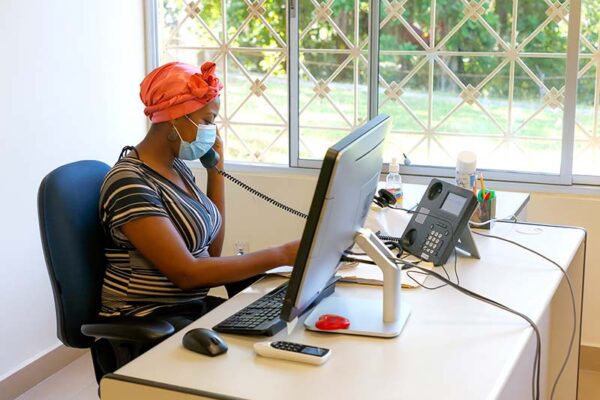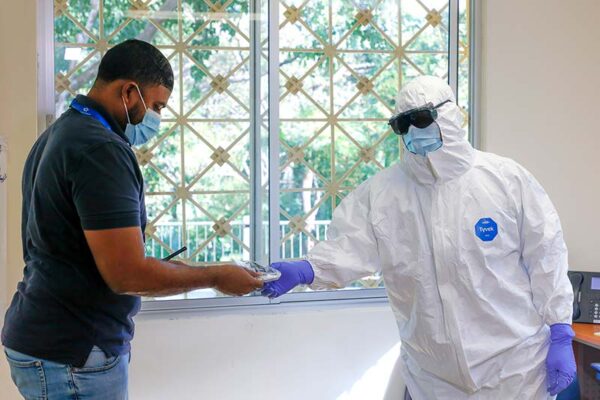One year after the pandemic: the sum of wills
“The waterway is as resilient as its workforce, and adapted to the new normal quickly, including new safety protocols, challenges related to telework and, in particular, to uncertainty.”
2020 tested our strength, solidarity and ingenuity to survive in unique conditions. In a world ravaged by the pandemic, which in Panama has claimed more than 6,000 lives, the Canal kept operating uninterrupted, guaranteeing its customers a safe and quality service.
How was this possible? The answer can be summed up in its people. The commitment of its workforce has been fundamental in this new reality to which we are adapting.
“We had our learning process in the company, and today it is something that the employee knows and carries with him from the moment he leaves work until he gets home. We have practiced all the rules to protect ourselves, our work teams and our families,” explains Leslie Pineda, Occupational Health and Safety Manager.
During 2020, Covid-19 management protocols were issued, which are mandatory and involve the rules of physical distancing, use of masks, constant hand washing, use of alcohol and alcohol gel. Also, the cleaning of facilities by means of nebulization by the organization’s own personnel who have been trained for these tasks. In addition, it is important to highlight the new coronavirus detection tests.
The Canal has clinics that provide follow-up to workers who have suffered from the disease and return to work in person to guarantee their health and wellbeing, while the Covid Management Center (CMC), which operates at the Ascanio Arosemena Training Center, in Balboa, has a telephone line that assists 24/7 to workers’ queries, and works in coordination with the Ministry of Health (Minsa).
Importantly, Pineda points out that in the Occupational Risk and Safety Committee, union representatives from the six bargaining units participate openly with information on areas that can be reinforced.

Responding to adversity
That resilience and capacity of the Panama Canal to adapt to the new reality imposed by Covid-19 was recognized in November 2020 by the United Nations Conference on Trade and Development (UNCTAD):
“The Panama Canal is as resilient as its staff, and adapted to the new normal quickly, including new security protocols, challenges related to teleworking and, in particular, to uncertainty,” UNCTAD states in its report.
UNCTAD recognized the tenacity of the men and women of the Canal, which made it possible to tell stories such as that of March 29, 2020, when the Holland America cruise ship Zaandam transited with passengers and crew members infected with Covid-19.
In these 365 days, global demand and new market realities were also met by the Canal.
“From the moment the biosecurity and confinement measures were announced in the country, we sent a letter to customers stating that the Canal is committed to maintaining a safe and uninterrupted service to all vessels; a commitment acquired by Constitutional mandate,” highlights Marianela Dengo de de Obaldía, Vice President for Communication and Corporate Image.
“While the country was in a total shutdown, we continued working with a reduced workforce, with those directly involved in the transit operation under strict biosecurity protocols to protect not only the collaborators, but also the crew of the ships using the Canal,” Dengo points out.
During this period, there have been no infections of Canal workers or crew members of vessels related to the transit operation.

Covid Management Center
The Covid Management Center (CMC), in Balboa, operates with Minsa doctors and Canal personnel. A comprehensive response plan has been implemented with the objective of reducing infections among Canal workers and not affecting waterway operations.
Detection and validation of infections; traceability; delivery of medication kits; follow-up of each worker in home quarantine; or the transfer of those who require hospitalization. In addition, a serological test is applied to all workers returning from vacations and/or teleworking, and more recently, a superficial swabbing is applied to the entire workforce, in order to detect asymptomatic workers and isolate them until they overcome the disease.